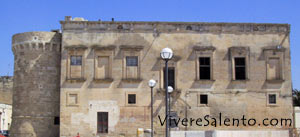|
|

| Inhabitants'
name: Martanesi
|
The civic coat
of arms of Martano is marked by a warrior riding a white horse and a Latin
inscription. As the
 origins
of this centre are concerned, the presence of the two menhirs of St. Totaro and
St.Sofia testify the human settlement since the prehistoric age. However, some
historians think that the first real inhabited centre was founded by the Greek.
This people had a strong influence on the habits of the centre, so much that,
still today, the inhabitants of Martano speak the "griko", a Greek dialect. In
1071 the Normans arrived: during the Norman domination Tancredi of Altavilla
gave the title of barons to twenty knights, and in 1192 he gave the feud of
Martano to the knight Giorgio Remanno. Later origins
of this centre are concerned, the presence of the two menhirs of St. Totaro and
St.Sofia testify the human settlement since the prehistoric age. However, some
historians think that the first real inhabited centre was founded by the Greek.
This people had a strong influence on the habits of the centre, so much that,
still today, the inhabitants of Martano speak the "griko", a Greek dialect. In
1071 the Normans arrived: during the Norman domination Tancredi of Altavilla
gave the title of barons to twenty knights, and in 1192 he gave the feud of
Martano to the knight Giorgio Remanno. Later his child Tommaso governed it but in 1269 he lost it because he had formed an
alliance with the Swabians in the war against the Angevins. So Charles I gave
the feud to Goffredo de Castelli and then, in 1300, to Rinaldo De Hugot. In 1373
Martano became a "casale" and it passed under the control of Rinaldo Sambiasi.
In 1480 the Turks invaded many villages, also Martano. The Aragoneses had it
strengthened. In 1468 Martano was ruled by Gesualdo Conti and in 1504 by Teodoro
Bocali, who was succeeded by his child Manilo and in 1532 by his nephew
Francesco Maria Bocali. In 1591 Giovanni Delli Monti bought Martano for 135,000
dukedoms; under his dominion the center expanded and its economic power
increased. In 1651 the feud was governed by Luigi Trani, in 1742 by Lorenzo
Brunassi, who sold it to Sebastiano Gadaleta for 50,000 dukedoms in 1748. The
Gadaletas reigned until 1806. The most important people are Luigi Protopapa,
Giuseppe Grassi, Salvatore Trinchese. Trinchese was born in 1836, he attended
the faculty of medicine at the University of Pisa, where he graduated. However
his favourite subject was animal biology. He taught zoology, first at the
University of Genoa, later at the University of Bologna. In
his child Tommaso governed it but in 1269 he lost it because he had formed an
alliance with the Swabians in the war against the Angevins. So Charles I gave
the feud to Goffredo de Castelli and then, in 1300, to Rinaldo De Hugot. In 1373
Martano became a "casale" and it passed under the control of Rinaldo Sambiasi.
In 1480 the Turks invaded many villages, also Martano. The Aragoneses had it
strengthened. In 1468 Martano was ruled by Gesualdo Conti and in 1504 by Teodoro
Bocali, who was succeeded by his child Manilo and in 1532 by his nephew
Francesco Maria Bocali. In 1591 Giovanni Delli Monti bought Martano for 135,000
dukedoms; under his dominion the center expanded and its economic power
increased. In 1651 the feud was governed by Luigi Trani, in 1742 by Lorenzo
Brunassi, who sold it to Sebastiano Gadaleta for 50,000 dukedoms in 1748. The
Gadaletas reigned until 1806. The most important people are Luigi Protopapa,
Giuseppe Grassi, Salvatore Trinchese. Trinchese was born in 1836, he attended
the faculty of medicine at the University of Pisa, where he graduated. However
his favourite subject was animal biology. He taught zoology, first at the
University of Genoa, later at the University of Bologna. In
 1875
he became Rector of the University of Naples and he died in 1897. Cosimo
Moschettini was born in 1747, he became a physician, a philosopher and an
agronomist. He was deeply interested in the olive-trees, in fact he wrote some
books about these plants and the production of the oil. 1875
he became Rector of the University of Naples and he died in 1897. Cosimo
Moschettini was born in 1747, he became a physician, a philosopher and an
agronomist. He was deeply interested in the olive-trees, in fact he wrote some
books about these plants and the production of the oil.
|